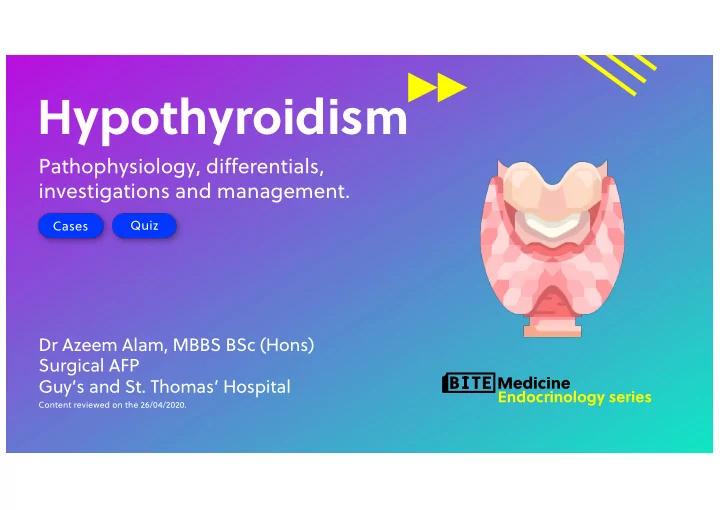

Hypothyroidism Pathophysiology, differentials, investigations and management. Quiz Cases Dr Azeem Alam, MBBS BSc (Hons) Surgical AFP Guy’s and St. Thomas’ Hospital Endocrinology series Content reviewed on the 26/04/2020.
Case 1 History A 36-year-old Caucasian female presents to her GP in London with ongoing fatigue. She has also gained a significant amount of weight and has been constipated recently. She looks tired and you note that she is wearing a woolly hat, despite it being a warm, summer’s afternoon. Observations HR 56, BP 126/84, RR 16, SpO 2 98%, Temp 37.4°C. 2
Case 1 History A 36-year-old Caucasian female presents to her GP in London with ongoing fatigue. She has also gained a significant amount of weight and has been constipated recently. She looks tired and you note that she is wearing a large coat, despite it being a warm, summer’s afternoon. Observations HR 56, BP 126/84, RR 16, SpO 2 98%, Temp 37.4°C. 4
Aetiology Pathophysiology Definition: a deficiency in circulating thyroid hormone. Thyroxine (T4) and tri- iodothyronine (T3). 6
Aetiology Primary hypothyroidism • 95% of cases • Iodine deficiency • Autoimmune thyroiditis • Transient thyroiditis TSH Free T4 Primary hypothyroidism ↑ ↓ Overt hypothyroidism Subclinical ↑ ↔ hypothyroidism 8
Aetiology Primary hypothyroidism Features Iodine deficiency Commonest cause worldwide Hashimoto’s thyroiditis Commonest cause in the developed (autoimmune) world • Autoimmune (anti-TPO antibodies) • Diffuse painless goitre • Transient thyrotoxic state, hashitoxicosis • Increased risk of non-Hodgkin lymphoma • Viral prodrome Subacute (De Quervain’s) • Transient thyrotoxic state thyroiditis (transient) • Painful goitre • Raised inflammatory markers 9 • Self-limiting
Aetiology Categorisation Causes • Iodine deficiency Primary hypothyroidism • Autoimmune thyroiditis • Transient thyroiditis • Drugs • Post-ablative therapy or surgery • Infiltrative disorders • Congenital 10
Secondary hypothyroidism Aetiology Secondary (central) hypothyroidism • Pituitary or hypothalamic disorder TSH Free T4 ↓ or ↔ ↓ Secondary hypothyroidism 12
Aetiology Categorisation Causes • Pituitary adenoma or glioma Secondary hypothyroidism (central) • Pituitary surgery or radiation • Vascular disorders • Pituitary apoplexy • Sheehan syndrome • Hypothalamic disorders • Infiltrative disorders • Drugs 13
Epidemiology Prevalence of any cause of hypothyroidism is 1-2%, with Hashimoto’s thyroiditis being the most common cause. • Female gender : 15-20x more frequent • Middle-aged: peak age is 30-50 years old • Family history • History of autoimmunity : e.g. pernicious anaemia or T1DM • Chest or neck irradiation • Thyroidectomy or radioiodine 14
Clinical features Symptoms Signs Weight gain Bradycardia Cold intolerance Goitre Lethargy Loss of lateral aspect of eyebrows Dry skin Hair loss Constipation Hyporeflexia Menorrhagia: later develop oligomenorrhoea and amenorrhoea 15
Clinical features (1) 16
Investigations: stable patient Primary investigations: • TFTs : decreased T3/T4 and increased TSH in primary hypothyroidism • Antibodies : anti-TPO antibodies associated with Hashimoto’s thyroiditis (95%) • Inflammatory markers : raised in De Quervain’s thyroiditis Investigations to consider: • Ultrasound : if there is a goitre or focal nodule and malignancy is suspected • Radionucleotide scan : not routine • FBC and serum B12 level : assess for possible pernicious anaemia • Fasting lipids : hypothyroidism is associated with hypercholesterolemia • Serum glucose and HbA1c : hypoglycaemia and T1DM • Coeliac serology : assess for coeliac disease 17
Investigations: autoantibodies Thyroid autoantibodies Autoantibody Condition Prevalence Anti-TSH receptor Graves’ disease 90-100% Hashimoto’s thyroiditis 0-5% Anti-TPO Graves’ disease 70-80% Hashimoto’s thyroiditis 90-95% Anti-thyroglobulin Graves’ disease 20-40% Hashimoto’s thyroiditis 30-50% 18
Management Overt hypothyroidism: • Levothyroxine (T4): offer levothyroxine with regular review of symptoms and TSH every 3 months Subclinical hypothyroidism: • Depends on the age, symptoms and TSH [3] • TSH > 10 mU/L and normal T4: consider levothyroxine • TSH < 10 mU/L and normal T4: consider 6 month trial of levothyroxine if symptomatic and < 65 years old • In all other cases observation is indicated 20
Myxoedema coma • Extreme manifestation of hypothyroidism • > 60 years old • Causes : hypothermia, infections (e.g. influenza), medication (e.g. amiodarone), surgery, trauma Symptoms Signs Long-standing hypothyroid symptoms Bradycardia and hypotension CNS : confusion, psychosis, Hypothermia : often < 35.5°C apathy Constipation Myxoedematous face Hypoventilation 23
Myxoedema coma: investigations Bedside • ECG : bradycardia Bloods • TFTs : raised TSH and reduced T4 • FBC : normocytic normochromic anaemia • U&Es : hyponatraemia and deranged renal function • ABG : hypoxia, hypercapnia, respiratory acidosis • Blood glucose : hypoglycaemia • Infection screen Investigations to consider : • Lipid profile : hyperlipidaemia • Serum cortisol : exclude adrenal insufficiency 24
Myxoedema coma: management General measures • ITU or HDU • NIV or mechanical ventilation: may be required • Correct hypoglycaemia and electrolyte disturbances • Slow warming Specific measures • IV thyroid hormone replacement : often levothyroxine alone (100-500 μ g), but controversial • Antibiotics : many advocate broad-spectrum antibiotics • IV hydrocortisone : assume adrenal insufficiency until excluded (100 mg) Mortality : 50% even if promptly treated Poor prognosis : elderly, hypothermic and bradycardic 25
Top decile question 26
Further information We need your feedback and support! Release new lecture schedules every Saturday New, interactive website coming very soon Want to get involved? Contact us at opportunities@bitemedicine.com to get your information pack Stay up-to-date! • Website : www.bitemedicine.com • Facebook : https://www.facebook.com/biteemedicine • Instagram : @bitemedicine • Email : admin@bitemedicine.com 28
References 1. Herbert L. Fred, MD and Hendrik A. van Dijk / CC BY (https://creativecommons.org/licenses/by/2.5) 29
Recommend
More recommend